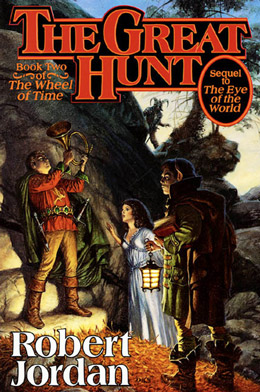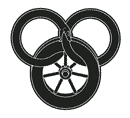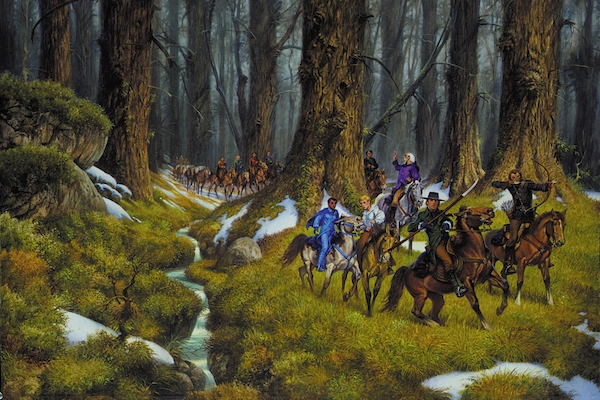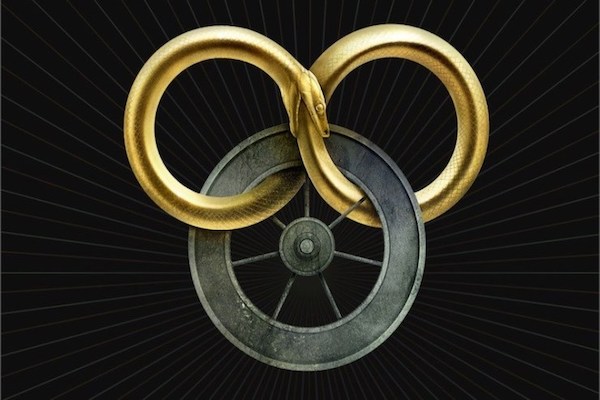Holy multiple chapters, Batman, it’s the Wheel of Time Reread Redux!
Today’s Redux post will cover Chapters 34, 35 and 36 of The Great Hunt, originally reread in this post.
All original posts are listed in The Wheel of Time Reread Index here, and all Redux posts will also be archived there as well. (The Wheel of Time Master Index, as always, is here, which has links to news, reviews, interviews, and all manner of information about the Wheel of Time in general on Tor.com.)
The Wheel of Time Reread is also available as an e-book series! Yay!
All Reread Redux posts will contain spoilers for the entire Wheel of Time series, so if you haven’t read, read at your own risk.
And now, the post!
Chapter 34: The Wheel Weaves
“You have a dangerous look in your eyes, Thom Merrilin. Imagine Dena sitting here, alive and hale. Think what she would say. Would she let you go off and get yourself killed to no purpose?”
“I’m only an old gleeman,” he said from the door. And Rand al’Thor is only a shepherd, but we both do what we must. “Who could I possibly be dangerous to?”
After this scene, that rather comes off the same way as if James Bond asked the same question, because damn, Thom. Go ‘head with your bad self.
I said in the original commentary that I thought Dena’s death was one of the most affecting in WOT, which HAHAHA not so much anymore, but I do think it is still one of the most effectively executed deaths in the series, no pun intended. This entire scene is just really well done, in fact, full of crackling action, intrigue, and general badassery. There’s a reason 007 came to mind, I think; it has that feel to it.
…Right down to the fridging of the female love interest to give the male character the motivation to go open a can of whoopass on everyone, of course. Which is… less awesome than the rest of it.
As the TV Tropes page rightly points out, fridging is often a sign of both latent (or sometimes not-so-latent) sexism and lazy writing. It’s lazy not because the brutal death of a loved one is not a legitimate motivation for a character to retaliate, because obviously it is; it’s lazy because it’s a motivation that’s used all the time, across pretty much every medium of storytelling we have, and after a certain point it becomes a cheap shortcut to move the plot along and/or generate angst on the part of the protagonist.
And it’s sexist because the vast majority of times the trope is used, the victim is a female character. And more than that, as is the case with Dena here, she is killed not through her own actions or because of her own choices, but merely because her death will have an impact on another, more important character, who is almost invariably male. As Marie Brennan puts it: “…it’s lazy writing that feeds a sexist substratum of thought which says women exist as adjuncts to men, they can’t be meaningful actors in their own right, and they are the natural victims of violence. Which is, y’know, not something we should be perpetuating.” Indeed.
All that said, this particular iteration of the trope does not bother me quite as much as I think it ought to, and I’m honestly not sure why. Possibly because Thom is not a central character of WOT, and this entire storyline amounts to barely even a subplot of the overall story? Though, that feels more like an excuse on my part, and sort of insensitive, too; just because Dena was a super minor character doesn’t mean her death was any less tragic and insulting.
Another (slightly better) reason might be the reminder that something being a trope, even a frequently sexist trope, doesn’t mean that all iterations of it are automatically bad. *shrug* Not sure. But for whatever reason, insufficient or otherwise, it feels less offensive to me than it might have if this was part of, say, any of the Superboys’ storylines.
…Although, Perrin’s storyline comes damn close to employing fridging, multiple times, now that I think about it. In fact, the only difference is that Faile didn’t actually die any of the times Perrin decided to smash the world over her. But we’ll save that rant for the appropriate time.
…And on further reflection, sigh, it happens in both Mat and Rand’s storylines as well, doesn’t it. Mat’s is actually worse than Perrin’s in some ways because it’s over freakin’ Tylin.
Rand’s, however, gets a pass because (a) the end of TFOH was completely awesome and I won’t hear different, and (b) for my money, fridging and then unfridging two major characters (one of whom is neither female nor a love interest) doesn’t count as either sexist or lazy writing in the slightest; indeed, it’s probably one of the more clever subversions of the trope I’ve ever read, even if Jordan himself never intended it that way specifically.
But back to Thom! Questionable motivation aside, even though I censured Thom in the original commentary for committing regicide, it’s admittedly hard to drum up much outrage over it when Galldrian was such a crap king. But then, even a crap king’s murder still causes more chaos than it ends, generally speaking, and that was certainly true in Cairhien’s case.
True, if someone was firing the granaries even before Thom killed Galldrian, the whole place was going to hell in a handbasket anyway, but still! Political assassination of heads of state, even lousy ones = bad! This should not be a debate! Even if it kind of is! Ugh.
Also:
Blah blah Fain, blah blah Seanchan, blah blah hate them.
… Yeah, that still pretty much sums it up.
Chapter 35: Stedding Tsofu
Is it just me, or does “Tsofu” sound like something you’d find at a sushi restaurant?
(Mm, sushi.)
More echoes of LOTR here, at least to me. Maybe it’s stretching it to say that the Ogier are something of a blend of Tolkien’s elves with his hobbits, but the set-up of the stedding (giant magic trees plus underground dwellings) certainly doesn’t help to dispel that impression on my part.
“Just smell this air, Lord Rand,” Hurin said, filling his lungs with a smile. His feet dangled from one of the chairs at the table; he swung them like a boy. “I never thought most places smelled bad, but this… Lord Rand, I don’t think there’s ever been any killing here. Not even any hurting, except by accident.”
Sounds idyllic. As long as you don’t mind being physically unable to leave, ever, except for relatively short periods of time, and also having no say whatsoever in who you get to marry, of course.
And while I was okay with letting Rand’s comparison of the Two Rivers’ matchmaking tactics to the Ogier’s pass the first time around, this time I’m calling bullshit. Because, I’m (fairly) sure that regardless of how pushily Rand and Egwene were maneuvered into their relationship, if either of them had really wanted out of it, they could have refused. (Fairly sure.) Whereas it seems from Loial’s description that he has absolutely zero choice in the matter, and no control over it short of literally running and hiding – which he can’t even do forever, because he is also literally physically compelled to have to return to the fold sooner or later.
(But sure, yeah. Super idyllic.)
That might not seem like such a huge difference to Rand, but it sure as hell does to me. Basically, the longer I look at it, the more fucked-up Ogier culture seems to be. But hey, at least they’re pacifists! Except when they aren’t! And trees, you know. Trees are cool.
Annnyway. What else.
Well, there was the Aiel, which I had totally forgotten about before now. I guess these were just random Maidens, though, since we never even learn two of their names and the third (Rhian) never appears again in the story as far as I am aware. So, sure, whatever.
Also, blah blah chivalry pfeh not even getting into that right now.
Chapter 36: Among the Elders
“I have never heard of this,” Alar said slowly, “Machin Shin waiting when a Waygate was opened. It always roamed the Ways. But it has been long, and perhaps the Black Wind hungers, and hopes to catch some unwary one entering a gate. Verin, assuredly you cannot use this Waygate. And however great your need, I cannot say I am sorry. The Ways belong to the Shadow, now.”
Rand frowned at the Waygate. Could it be following me? There were too many questions. Had Fain somehow ordered the Black Wind? Verin said it could not be done. And why would Fain demand that he follow, then try to stop him?
I don’t think this question – why or how the Black Wind was apparently following Rand around – was ever definitively answered. I doubt that Fain was controlling it, though. As Rand himself points out, he wanted Rand to follow him to Falme, and while Fain wants Rand dead (and would probably be fine with him becoming a mindless drooling husk too), he evidently wants to do the job himself. So while I’m sure Fain wouldn’t mind making Rand’s journey unpleasant, I don’t think he would contrive to make it impossible.
So Machin Shin was probably doing it on its own, for some reason. Maybe it senses that Rand was a threat to Evil Itself and was acting in instinctive self-preservation. Or maybe it just thinks that ta’veren have exceptionally tasty souls, and is following the yummy treats around like the world’s least attractive stray dog. Or maybe it is proto-Messiah soul in particular that it would like to nom on.
*shrug*
“The Brown Ajah knows many things,” Verin said dryly, “and I know how the Stones may be used.”
Tricky, very tricky. I note that Liandrin also knows how to use Portal Stones later. Maybe this is one of the things only Black Ajah sisters still know about?
And… yeah, that’s really all I have to say about this chapter.
So we’ll stop here, for really crazy things are coming up! I love y’all more than my luggage, and will see you next Tuesday!
















